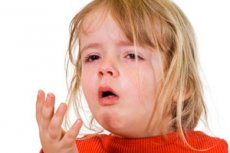Medical expert of the article
New publications
A child has a dry cough: how to treat?
Last reviewed: 05.07.2025

All iLive content is medically reviewed or fact checked to ensure as much factual accuracy as possible.
We have strict sourcing guidelines and only link to reputable media sites, academic research institutions and, whenever possible, medically peer reviewed studies. Note that the numbers in parentheses ([1], [2], etc.) are clickable links to these studies.
If you feel that any of our content is inaccurate, out-of-date, or otherwise questionable, please select it and press Ctrl + Enter.

If a child has a dry cough, you should first find out the reasons that cause it. It is necessary to clearly understand what a cough is and what its main function is. Cough occurs against the background of various respiratory diseases and is a protective reaction of the body, necessary to eliminate irritants.
To differentiate a child's dry cough and determine its origin, it is necessary to take into account the following characteristics: the cough can be acute or chronic, dry or productive.
What causes a child to have a dry cough?
A child's dry cough is often a companion of acute respiratory viral infections - viruses get onto the mucous membrane of the pharynx, trachea, larynx, which causes irritation, inflammation, the mucous membrane becomes dry, and a tickling and scratchy feeling occurs in the throat. In such cases, regular moisturizing of the mucous membrane is indicated, for example, with the help of herbal inhalations with chamomile, calendula, sage, as well as frequent rinsing. Do not forget to regularly ventilate the room. In case of bronchial asthma or pollen allergy, herbs are not used.
If a child has a dry cough that lasts for more than three weeks and usually has no other symptoms, it is called chronic. Cough can be a sign of many diseases, the most common of which are the following: runny nose, allergies, bronchitis, bronchial asthma, as well as the ingestion of a foreign body or the use of medications.
A very strong or prolonged cough can cause somatic or psychological complications that negatively affect the quality of life of the child and his relatives, so if a child has a dry cough that leads to a deterioration in health, you should immediately consult a doctor, since only a specialist can understand the symptoms, differentiate the disease and make a diagnosis, and then prescribe a course of treatment.
How does a child develop a dry cough?
Acute cough may be accompanied by symptoms such as runny nose, weakness, loss of appetite, fever, pain and discomfort in the throat.
A child has a dry cough associated with an allergic reaction, is paroxysmal, begins suddenly, and can last for quite a long time. Depending on the allergen that caused the cough, the treatment method is selected in each case individually by the attending physician.
How to treat a dry cough in a child?
It is important to remember that if a child has a dry cough, it is necessary to drink a lot of warm liquid, as this improves the liquefaction of sputum and normalizes the water balance. Thermal inhalations in the absence of fever are also an effective method (inhalations are highly undesirable for children under four years of age). Remember that antitussive drugs can cause various side effects and are prescribed only by a specialist. Coughing in the morning usually occurs with a runny nose, as a result of the mucus from the nose getting into the respiratory tract. With a dry and wet cough with the formation of thick and viscous sputum, the doctor can prescribe mucolytics, which are available both in tablets and syrups. Taking medications that liquefy sputum can be combined with a massage procedure. To do a massage, fix your fingers in the area of the child's intercostal spaces and perform light tapping movements on the chest, excluding the heart area. The massage can last about five minutes, and should be done two or three times a day. In children, a dry cough, unlike a wet cough, may be caused not by the formation of sputum, but by irritation of the cough receptors due to an inflammatory process or thermal, physical or chemical effects. Therefore, in such cases, a dry cough does not bring relief to the body, but on the contrary, can provoke the appearance of undesirable consequences. In children, a dry cough is treated based on the principle of suppressing the cough reflex, since there is essentially nothing to cough up. Frequent and intense coughing entails an increase in intrathoracic pressure and can provoke the development of hypertension and other negative consequences.
Cough is one of the most common problems that parents bring their child to the doctor with. If a child has a dry cough, it may be a symptom of various diseases and requires careful examination and observation by an experienced doctor. It is unacceptable to take medications and carry out treatment procedures without prior consultation with a pediatrician.

